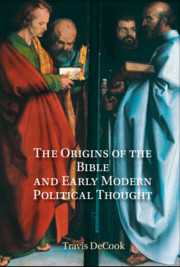 The Origins of the Bible and Early Modern Political Thought
The Origins of the Bible and Early Modern Political Thought Book contents
- The Origins of the Bible and Early Modern Political Thought
- The Origins of the Bible and Early Modern Political Thought
- Copyright page
- Dedication
- Contents
- Acknowledgments
- Introduction
- 1 The Primordial Bible
- 2 The Extrinsic Bible
- 3 Scripture Atomized
- 4 The Trial of Scripture
- 5 The Religion of the State
- Conclusion
- Bibliography
- Index
Conclusion
The Bible and Time
Published online by Cambridge University Press: 02 March 2021
- The Origins of the Bible and Early Modern Political Thought
- The Origins of the Bible and Early Modern Political Thought
- Copyright page
- Dedication
- Contents
- Acknowledgments
- Introduction
- 1 The Primordial Bible
- 2 The Extrinsic Bible
- 3 Scripture Atomized
- 4 The Trial of Scripture
- 5 The Religion of the State
- Conclusion
- Bibliography
- Index
Summary
The Conclusion takes up the afterlife of the understandings of the Bible’s relationship to history consolidated in the sixteenth and seventeenth centuries. It does this by exploring the writings of modern biblical scholar David C. Parker, arguing that they reveal how these contingent understandings and their political implications have become naturalized, and how theological integrations of the Bible’s divine and historical dimensions have become obscured. The Conclusion proceeds to consider how this evacuation of theological depth is at the heart of the story this book has sought to tell. Rather than see the history of the Bible simply as the battleground between transcendent and immanent accounts, the Conclusion underscores the need to address the larger theological and metaphysical frameworks in which forms of biblical transcendence and immanence are articulated. The Conclusion ends by highlighting how the book has shown that theologically and metaphysically thin conceptions of Scripture have been mobilized in the service of newly atomized ways of thinking about and ordering human life.
- Type
- Chapter
- Information
- The Origins of the Bible and Early Modern Political ThoughtRevelation and the Boundaries of Scripture, pp. 177 - 184Publisher: Cambridge University PressPrint publication year: 2021
